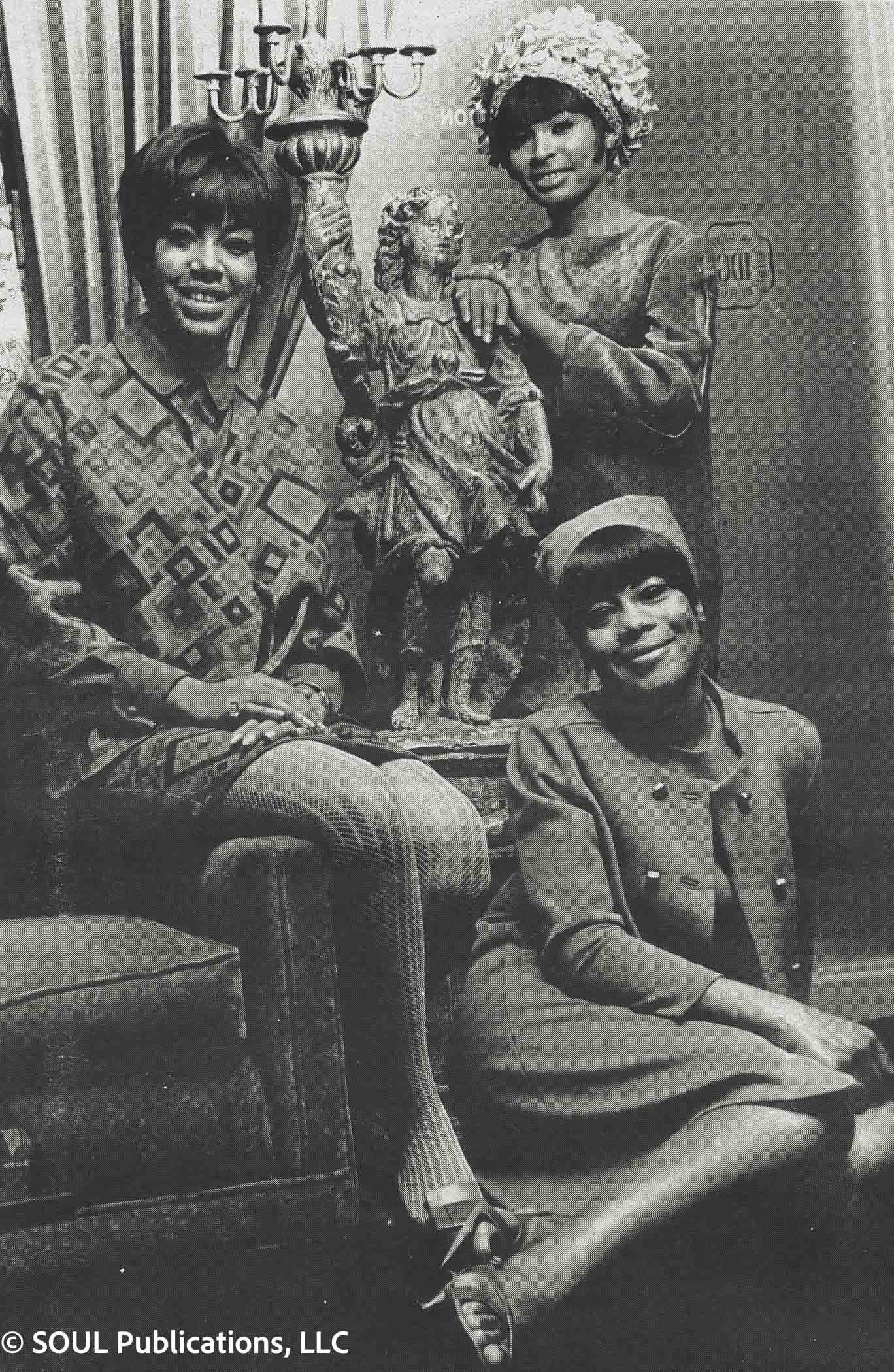Girl Talk with The Marvelettes: 1967 Interview with SOUL
June 10, 2022, 4:25 PM PST
The Marvelettes, Wanda Young, Katherine Anderson and Gladys Horton at the SOUL Newspaper offices for an interview. Photo by Erik Whitaker.
Quick information on The Marvelettes:
-
The original members of The Marvelettes were Gladys Horton, Katherine Anderson, Georgeanna Tillman, Juanita Cowart and Georgia Dobbins. Wanda Rodgers (neé Young) would join in 1961 replacing Dobbins. Cowart would leave in 1963 and Tillman would leave in 1965. The group became a trio at this point. In 1967 Horton left the group and was replaced by Ann Bogan. The group officially disbanded in 1972.
-
The Marvelettes (then known as the Casinyets) were formed at Inkster High School in Inkster, Michigan, a suburb of Detroit.
-
The group was originally known in 1960 as The Casinyets, a play on “Can’t Sing Yet”, an inside joke amongst the group. They changed their names to The Marvels in 1961. They were renamed The Marvelettes by Berry Gordy after he signed them to the Tamla division of Motown Records later that year. They soon after recorded their first hit “Please Mr. Postman”
The Marvelettes 1967 at the SOUL Newspaper offices in Los Angeles, California. Photo by Erik Whitaker
The Marvelettes were Motown Record's second success after the Miracles and the label's first momentously successful girl group. The original lineup consisting of Gladys Horton, Katherine Anderson, Georgeanna Tillman, Juanita Cowart and Georgia Dobbins would go through many changes over the years. Being successful was no easy task and making it as a Black Female group at that time came with even more barriers to entry.
Although involved in the songs creation, Dobbins would leave the group before their soon to be smash hit "Please Mr. Postman" got them signed to Motown Records (Tamla Division) in 1961. Her family was getting bigger and her father was not supportive of her continuing her career. She was then replaced by Wanda Rogers (neé Young). Juanita Cowart left in 1963 due to the stresses associated with touring and Georgeanna Tillman left in 1965 because of complications with sickle cell and lupus. Wanda Rogers took over as lead vocalist for the now trio of Rogers, Horton and Anderson in 1965.
Around this same time the "British Invasion" by rock bands and musicians on to the American music scene sidelined many recording artists in the US. In Motown, Martha and the Vandellas and The Supremes were rising up the ladder. With a few successful hits after a long period of stagnation, The Supremes would become Motown's marketing priority.
By 1967 The Marvelettes had recorded several more charting singles such as, "Playboy", "Locking Up My Heart", "Too Many Fish in the Sea", "I'll Keep Holding On", "Don't Mess with Bill", "When You're Young and in Love" and "The Hunter Gets Captured by the Game". Later that year Gladys Horton would also leave the group after her child was born with cerebral palsy. She would be replaced by Ann Bogan.
The Marvelettes struggles with internal complications, Motown's promotional neglect and pay discrepancies caused the group to eventually fall by the wayside. The group seemed to be almost abandoned by the people they had entrusted their careers with. There was also a uniquely revolving door with members that made any long term cohesion difficult to solidify.
By the 1970s most of the member's were no longer singing together. Roger's released a solo album marketed as "The Return of the Marvelettes" and produced by Smokey Robinson, but she was the only member of the group on the record. When Motown moved to Los Angeles in 1972, the group broke up for good.
There is a lot more to unpack around the story of the Marvelettes. The struggles black female music groups went through at the time (and for the most part continue to go through) were real and were starkly different than those of their male counterparts. It would be hard to imagine a man at the time leaving a successful music group to care for a child.
With all the challenges the group would ultimately face, I'd like to take us back to 1967 during one of the peaks of their success when The Marvelettes stopped by the SOUL Newspaper offices for an interview. Wanda, Gladys and Katherine spoke to SOUL Staff writer Harmonie about their careers and their perspective of being a woman in the industry.
The Marvelettes, Wanda Young, Katherine Anderson and Gladys Horton at the SOUL Newspaper offices for an interview. Photo by Erik Whitaker
The following is an excerpt from the article "Girl Talk With The Marvelettes" by Harmonie published in SOUL Newspaper July 6, 1967.
One group of girls who have not only been successful in this business, but have more than deserved that success are the Marvlettes -- a favorite group with everyone, male and female. When the girls dropped into our offices the other day for a brief visit, we decided to get their feminine point of view on the music industry and we chatted for some time. We began speaking with the girls about some of
the advantages and disadvantages of being a female in entertainment industry. Gladys explained her point of view:
Advantages
"Some of the advantages
of being a female vocalist is that you get to travel, and in doing this you get to be more in style, because certain parts of the country get styles later than other parts of the country -- and you can dress more like the girls in the magazines. And, you know about the make-up a little bit more than if you were just at home. "You get to try different costumes for the stage, and try different hair styles -- you're continuously fixing your hair! You get to go a lot of places and meet a lot of people, and different personalities.
Disadvantages
"Now, some of the disadvanages are that most people seem to think that entertainers are loose people like, they're game for everything. And sometimes a woman in this business is put in a certain class -- they'll say, Well, I know she's an entertainer so I know that she knows what's happening! And, you might be innocent of these things -- especially if you travel with a road manager like we do, and you're pretty well situated. Were not wild or anything, but you know one apple can spoil the whole bunch!" Gladys passed the conversation to
Katherine, who agreed with her sister Marvelette: "Well. I think
you've covered it I think the most important things, especially for young ladies, is to keep your reputation good, because it's so
easy - when you're traveling -- to make your reputation bad. The hardest thing is trying to keep your name clean.
All three of the girls agreed that it is often easier to perform for a predominantly male audience as they are generally more responsive, while the girls tend to be more critical of appearance rather than performance.
Performer's Responsibilities
Wanda joined the chatter when we got around to the responsibilities of a performer to his public, and she explained that, "The most important responsibility is to try to please your audience. A lot of
places we go to, we might have different people out there who have different opinions, and they might want to hear certain tunes. So you fill your repertoire with variety."
It is impossible to talk about soul music history without at least mentioning The Marvelettes. Their impact on music and early achievements would pave the way for many other successful groups. Their signature sound continues to inspire artists to this very day.
***
SUBSCRIBE TO
Become a member of the SOUL family by subscribing to the SOUL FAMILY and learn more about The Marvelettes, Aretha, Tammi Terrell, soul music history and other entertainers like Diana Ross, Michael Jackson, Bootsy Collins, The Supremes, The Temptations and more in our growing archive of SOUL Newspaper digital back issues.
Flip through all of the issues in our growing digital catalogue of SOUL, America's first Soul Music Newspaper! Full issues featuring photos, interviews and articles on your favorite entertainers spanning 1966 to 1982. Newly archived issues added every two weeks until our archive is complete!









